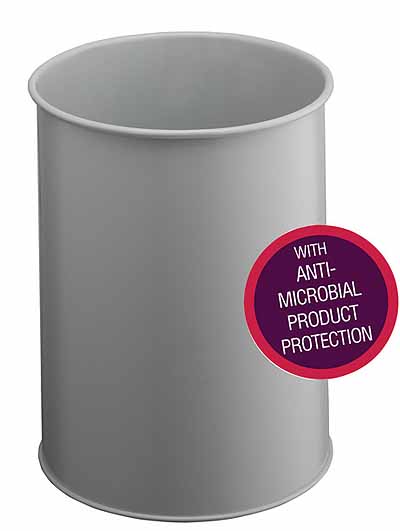Smead Europe BV
Smead is keeping you organised
Located in Hoogezand, the Netherlands, Smead Europe BV is a subsidiary of the Smead Manufacturing Company, a leading US supplier of filing and archiving, desk and office accessories, office furniture, and books, pads and forms.
The company was formed by Charles Smead in Hastings, Minnesota, in 1906, and has been run by a female member of the Smead family since 1955. Smead’s extensive range of products is the result of a rich history of product innovation – a foundation from which the business launches new and exciting office products and organisational solutions. Smead has three production sites in the Netherlands, and one facility in Estonia, alongside sales offices all over Europe.
Smead’s products are renowned for their high functionality and quality designs. More recently, the organisation launched its innovative ‘Anti-Microbial’ range of products, which meet the concerns relating to the growth of bacteria, fungi and other microbes on office supplies and equipment. Smead Europe managing director Reiner Eckhardt explains the benefits of the range: “Smead products with Anti-Microbial protection ensure protection both inside and out. Within two hours of contamination, the AM protection destroys 99.5 per cent of applied bacteria and viruses, and within 24 hours, this figure rises to 99.9 per cent. The Anti- Microbial treatment will also be effective against the growth of bacteria, fungi and other microbes. In turn, Anti-Microbial protection increases product quality and lifetime and may help companies meet health industry standards and prevent or minimise damage claims.”
Reiner continues by highlighting some of the products pioneered by Smead Europe: “We recently introduced the ‘Chameleon’ product range of customised metal products, such as bins. We can offer customers specially designed bins that feature corporate logos and colours, and we can do this in a delivery timeframe of less than three weeks. Smead is also launching a new filing product in Europe called FasTab, which is an A4 suspension file with a 40 per cent larger cardboard built-in tab, instead of a separate tab and a separate tab insert. The benefit of the new system is that whereas preparing a normal suspension file takes on average 35 seconds, the FasTab suspension file is ready in only five seconds, which can really make a difference for users. FasTab suspension files are also better for the environment, since there are no plastic tabs to worry about when you dispose of them.”
Finally, Smead introduced its Evolution trolley range to general acclaim. Reiner describes the reasons behind the popularity of the product: “The executive Evolution line of trolleys features attractive styling and technical innovations that make them highly effective and a pleasure to use, and Evolution suspension file trolleys provide filing capacity in a variety of ways that match the user’s filing habits and workplaces. Smead Executive Evolution trolleys are ergonomically optimal – the height is ideal for filing while either sitting or standing, and allows the access of files and office supplies with maximum comfort. This makes Evolution Trolleys the ideal products for an office or home office.”
To improve its levels of service and product distribution speed, Smead Europe recently focused on implementing Lean techniques into its operations. The Lean program was managed with support from Smead US, and executed first at the larger sites in Estonia and Hoogezand. The simple distribution project was defined and installed with the support of Beaufort Consultancy. A team of Lean Advisors worked with Smead’s European Productive Maintenance advisors, who could spread this knowledge throughout the European organisation. The team found that employees were not always trained to the fullest extent, workloads were not always balanced appropriately, and there was not enough communication between departments. In light of these findings, the following Lean concepts were introduced: target lead times, quality standards, communication guidelines, and the full training of employees.
In August 2007, the company also started the ‘Simple Distribution’ project, which targeted the significant reduction of physical distribution costs, without lowering customer service. The project was divided into three phases: the analysis of the current situation and the creation of a cost model; a detailed insight in total cost of warehousing and transport; and the building of a number of scenarios for future improvements.
Elaborating on the project, Reiner states: “The first step was to understand the current situation and identify areas for improvement via a crossfunctional team. This gave us an insight into the cost of warehousing and transport, which allowed us to create a calculation model that predicts the cost for new business and tenders. We then developed an implementation plan for changes in the distribution network, the optimal warehouse footprint was defined, and, as a result, seven warehouses will be integrated into two central European warehouses.”
As companies manufacturing office-based commodities increase in volume in the Far East, Smead remains optimistic towards future opportunities. As Reiner describes: “We see the challenges associated with increased competition as also providing a number of openings for us at the same time. As Smead is one of the few global suppliers of office products, we can benefit from involvement in and exploration of emerging markets like India, for our branded products alongside our channel partners. At the same time, the booming areas in the Far East are not only supplying low cost commodities, they are also large markets for branded products, and this is also a great opportunity for our company,” he concludes.
Smead Europe BV
Products: Stationery products and filing solutions
Sites: Netherlands and Estonia
Employees: 1000
www.smead-europe.com
